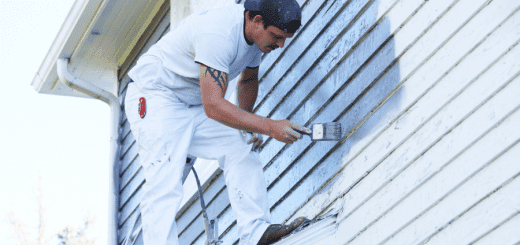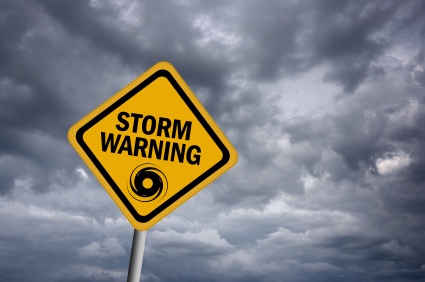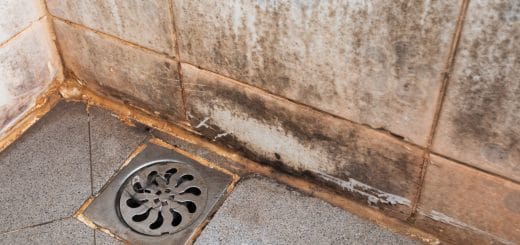Is it Safe to Live in the Basement of a Home?
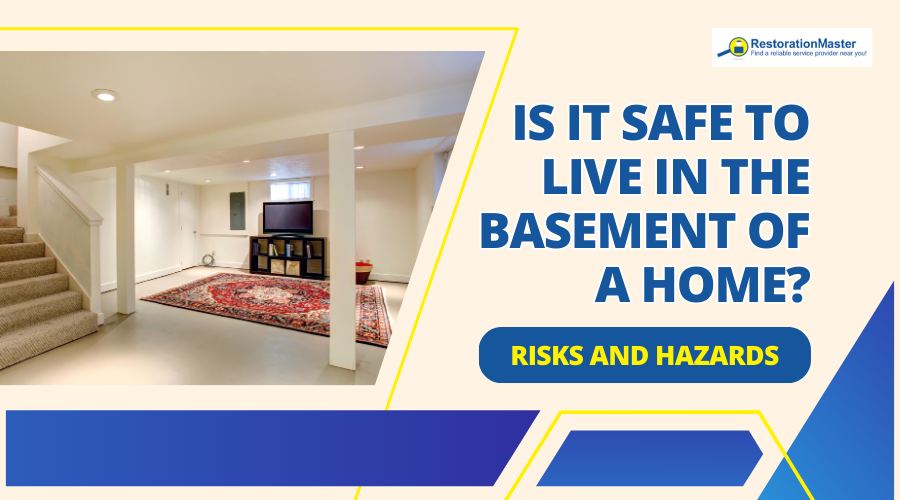
Technically, it is both legal and illegal to live in a basement in the United States, but some states have laws prohibiting basements from being used as habitable space. However, there are certain states where it is perfectly acceptable to do so as long as you don’t break any other laws. Many homes have basements that are finished and used as a living space.
Although basements are commonly used as living spaces, it is important to know that basements can pose safety hazards. From dangerous gases to fire safety, asbestos risks, and issues with your furnace, you can put your loved ones in danger if you do not check these regularly. If you are considering transforming a basement into a livable space, understanding the advantages and disadvantages, along with essential restorationRestoration is the process of returning a property to its pr... More tips, is crucial for creating a comfortable home.
Is it Safe to Live in a Basement?
As long as proper precautions are taken to mitigateTo mitigate is to reduce or limit the severity of damage, ri... More risks, living in a basement can be safe. Living in a basement can be cost-effective and energy-efficient, making it a common thought for homeowners and their loved ones. Homeowners should consider having professional restoration specialists inspect the basement before moving forward with restorationRestoration is the process of returning a property to its pr... More. Professional technicians will be able to identify any hazards or concerns that should be addressed beforehand.
What Are The Potential Hazards of Living in the Basement?
Living in a basement can offer unique advantages, such as additional space, and a lower cost of living. However, it is essential to be aware of the potential hazards that come with this choice. Here are a few things you should be aware of when it comes to basements.
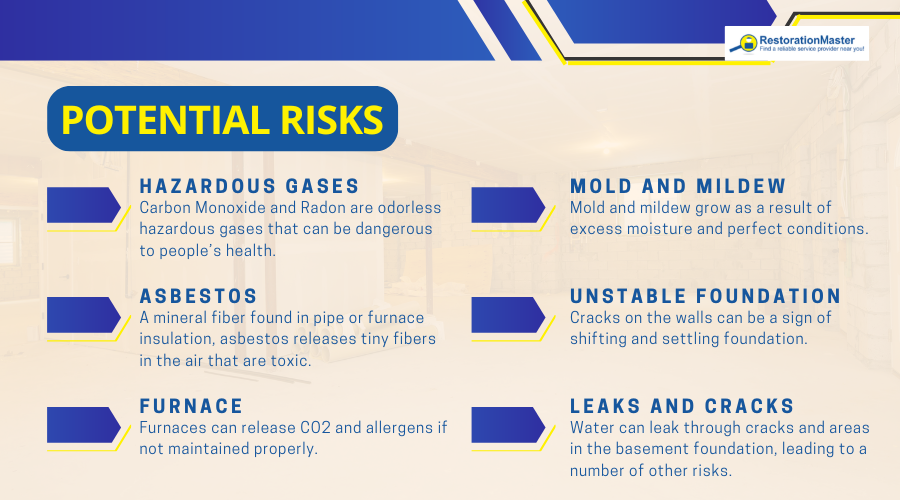
Hazardous Gases
Carbon Monoxide is odorless, and it is produced when oil, coal, or wood is burned. It may cause major illness or death, so it is important to be safe with it. RadonRadon is a naturally occurring radioactive gas that can accu... More is an odorless and radioactive gas. It comes through the cracks in the walls and floors, and it is coming from the bedrock below the home. It can only be detected via special equipment.
To keep yourself and your family safe from these hazardous gases, smoke, radonRadon is a naturally occurring radioactive gas that can accu... More, and carbon monoxide detectors should be installed in your basement and every floor of your home. It is also recommended to have your furnace inspected every year and ventilate your home properly if you use fuel-burning heat sources. Have your home tested by a professional company or you can purchase a test from the hardware store and test it yourself. If an issue is detected, make sure you follow instructions from the professional company on how to deal with radonRadon is a naturally occurring radioactive gas that can accu... More so you can make sure you keep your family safe.
Asbestos
This is a mineral fiber that can be found in pipe or furnace insulationInsulation is a material used in buildings to reduce the tra... More. When it is damaged it releases tiny fibers in the air and can be inhaled. Long-term exposure can have serious health risks such as lung cancer. You should have your home regularly inspected by a professional company to ensure the health and safety of your loved ones.
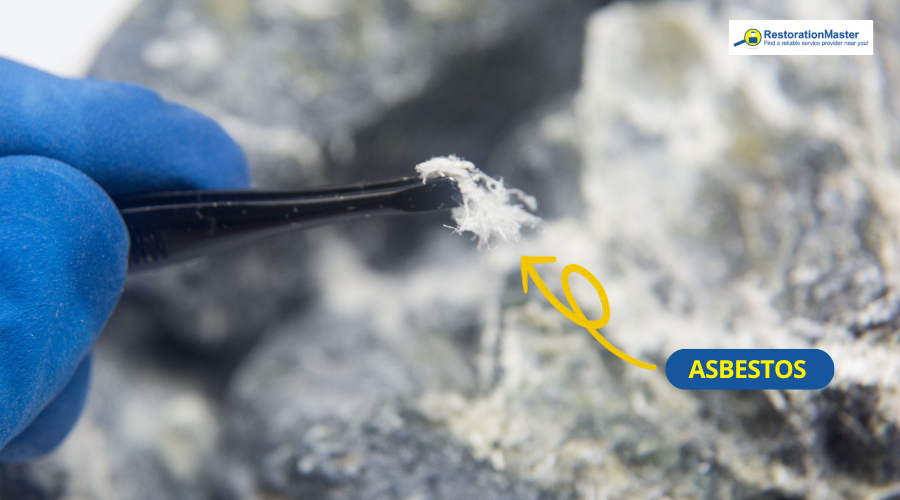
Furnace
You should clean and maintain the furnace to ensure that it does not release CO2 and allergens that can trigger upper respiratory issues. Keeping it maintained will also help lower your energy costs. Finally, you should make sure to change your filters regularly and have the furnace itself cleaned professionally so that it runs properly and most efficiently.
Bad Smells
A bad smell in your basement can be a sign of water collecting somewhere. Make sure to check all possible surfaces including wood, drywall, cloth, and painted signs of moisture. Check the crawlspace as well.
Leaks and Cracks
It doesn’t take much for water to leak into your basement and cause structural water damage to your property. Make sure to check your windows and concrete surfaces for cracks and repairRepair is the act of fixing or restoring damaged property, m... More them as needed. Always repairRepair is the act of fixing or restoring damaged property, m... More before the cracks become too large.
Unstable Foundation
Basements are crucially important to the structural integrity of your home. Always look for any signs of cracks on your walls as this can be a sign of settling or shifting. Some cracks are okay, however, very large cracks can signal that you may have an unstable foundation.
Mold and Mildew
Keep mold and mildew at bay in your basement by always checking all areas including walls and floors for moldMold is a type of fungus that grows in damp or humid conditi... More. Using a dehumidifierA dehumidifier is a device that removes excess moisture from... More can help as well and if you do notice large amounts of moldMold is a type of fungus that grows in damp or humid conditi... More, make sure to have a professional treat it so it does not come back.
How Can I Keep My Basement Safe?
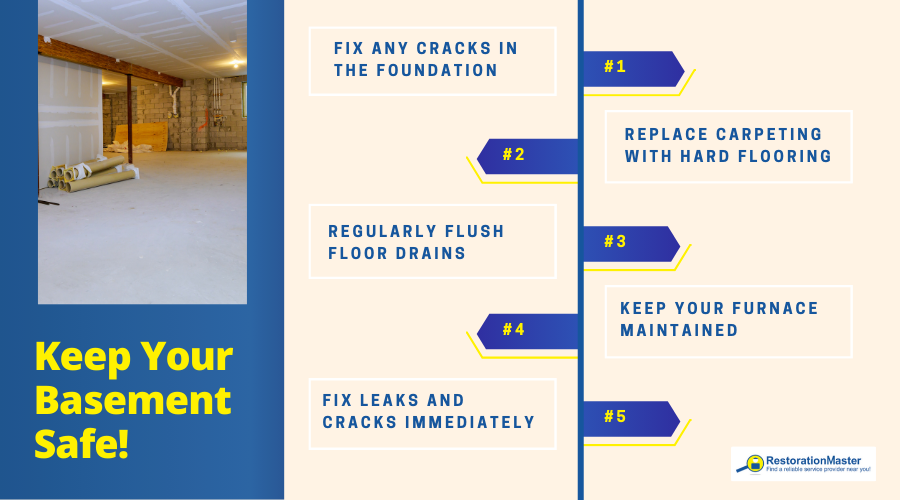
These are the things you should do to keep your basement in the best shape:
- Fix any cracks in the foundation
- Replace any carpeting with hard flooring
- Regularly flush floor drains with water to prevent sewer gases from seeping into your basement
- Make sure to have your furnace maintained properly to ensure that no gases are produced that can harm you or your family
- Keep any leftover paint, adhesives, or varnish away from basements as over time the cans can get damaged, and toxins can seep into the air and cause allergens that are harmful to your health.
- Ventilate the area often
- Fix cracks and leaks immediately
Even if you take all the above precautions in your basement, you may face an unexpected issue such as basement water damage. Whether it is caused by a burst pipe, a leaky appliance, or floodingFlooding is the overflow or accumulation of water in areas t... More, it is important to react quickly and prevent moisture from causing further damage. Once water seeps into porousPorous describes a material that contains small openings or ... More materials, it can cause major damage such as staining, rotting, and even structural damage to your property. Make sure you call a water damage restoration professional at the first sign of water damage in your basement to remove the water and prevent more serious issues.
If you are facing challenges in your basement or need expert assistance to create a safe and comfortable living space, restorationRestoration is the process of returning a property to its pr... More technicians are here to help. Professional restorationRestoration is the process of returning a property to its pr... More specialists can inspect and address any safety hazards that basements may pose. With extensive training and experience in basement restorationRestoration is the process of returning a property to its pr... More, mold remediation, and safety assessments, they will provide specialized solutions tailored to your needs.










